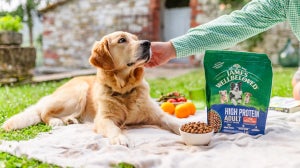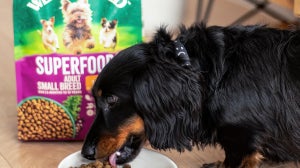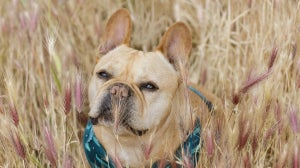
Can a dog eat cheese? It's a good question, we all know dogs LOVE cheese but they are lactose intolerant, so it’s highly likely to cause digestive upset in the form of abdominal discomfort or loose stools. The degree to which it affects dogs varies greatly with some more susceptible than others. It's a highly praised reward for dog training and a delicious treat so the sensible advice would be to only offer mild varieties of cheese and in very small amounts, monitoring closely to see if and how your dog reacts.
Is Cheese Safe for Dogs?
Cheese is generally safe for dogs, with many breeds and trainers feeling the benefits as it can be a high-value treat to help canines act when they normally wouldn’t.
With that said, dog are lactose intolerant and can also be sensitive or allergic to other ingredients within cheese so it shouldn’t be part of their diet. And there are certain types to avoid due to toxicity, like Stilton, which contains Roquefortaine C and can cause vomiting, diarrhoea, and sometimes seizures, as well as cheese paired with herbs like onion, garlic, or chives.
If you’re looking for more information about which foods your dog should avoid, read here.
Away from those, dogs can eat cheese providing, they do not suffer from digestive upset, but always pick low-fat, low-salt options like mozzarella or cottage cheese if considering it as a treat, and always feed in moderation.
Nutritional Benefits of Cheese for Dogs
Cheese is rich in nutrients that support your canine’s health, like protein, calcium, vitamin A and B-complex, as well as being a handy energy source and useful training reward, especially if your dogs don't respond to other treats or cues.
Nutrient Benefits
Protein promotes muscle development and overall growth
Vitamin B-complex supports the immune function
Fatty acids boost skin health
Calcium strengthens bones
Vitamin A supports vision
Although a dog can eat cheese, be cautious and always check the fat, salt, and sodium content. Too much of any can lead to weight gain, and in the case of sodium, it can be harmful to your pet.
Potential Risks When Feeding Cheese to Dogs
There are risks of feeding your dog cheese, especially if they have pre-existing conditions or food allergies, and all dogs are lactose intolerant. Due to the high calories and salt, weight gain can lead to obesity and even pancreatitis, which is an inflammation of the pancreas.
If you’re considering feeding your dog cheese, always do so at a gradual pace in small amounts while watching how they react. If vomiting, diarrhoea, or general gastrointestinal issues follow, then you must not feed them any cheese. However, before all of that, chat with your vet to see if the food is suitable for your pet.
Best Types of Cheese for Dogs
When it comes to human foods dogs can eat, cheese is one of them. But it should come with caution and care.
Choose low-fat, low-salt cheese like mozzarella, Red Leicester, and cottage cheese. These provide a healthy treat without overloading your doggy’s system with too many calories. Stay away from Stilton due to Roquefortaine C, which can cause digestive issues.
And never feed your dog cheese which contains any of the Allium family, such as onions, garlic, chives, shallots or leeks. These are all toxic to canines.
How Much Cheese Is Safe for Dogs?
It depends on your breed's size. Small dice-sized cubes for small pets, slightly bigger cubes for medium dogs, and increased cubes for larger canines. Always feed in moderation to prevent weight gain or intestinal issues, and never exceed the 10% of a dog’s daily calorie intake that’s usually reserved for treats.
Using Cheese as a Training Treat
Cheese can be useful as a training treat, especially as a high-value incentive due to the attractive aroma and taste. It can help conceal medication, too.
But always cut into pieces suitable to your dog's size and feed in moderation. Whilst cheese contains some health benefits, there are other healthy dog treats available.
What to Do If Your Dog Has a Bad Reaction to Cheese
Symptoms of cheese intolerance or allergies in dogs include vomiting, diarrhoea, itching, redness, rashes, gas, skin complaints, and general abdominal discomfort. If any of these happen, stop cheese consumption straight away and chat with your vet.
There you are, with careful consideration, some dogs can eat cheese, and for the most part, it's a safe snack for most canines. However, always feed in moderation due to the high salt, high fat content, and remember, dog’s, are lactose intolerant. Never offer cheese if your dog has a sensitivity or allergy to the ingredient within the cheese.
Always ask a vet before introducing cheese to your dog’s diet, then watch how they react when eating to see if it’s suitable.
We’ve included a full list right here of what dogs can and can’t eat.









